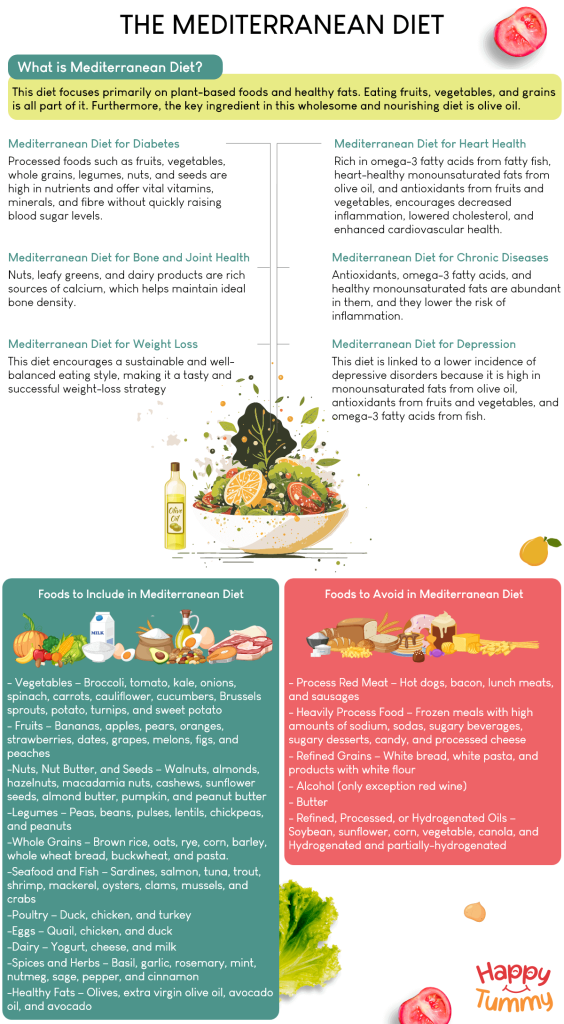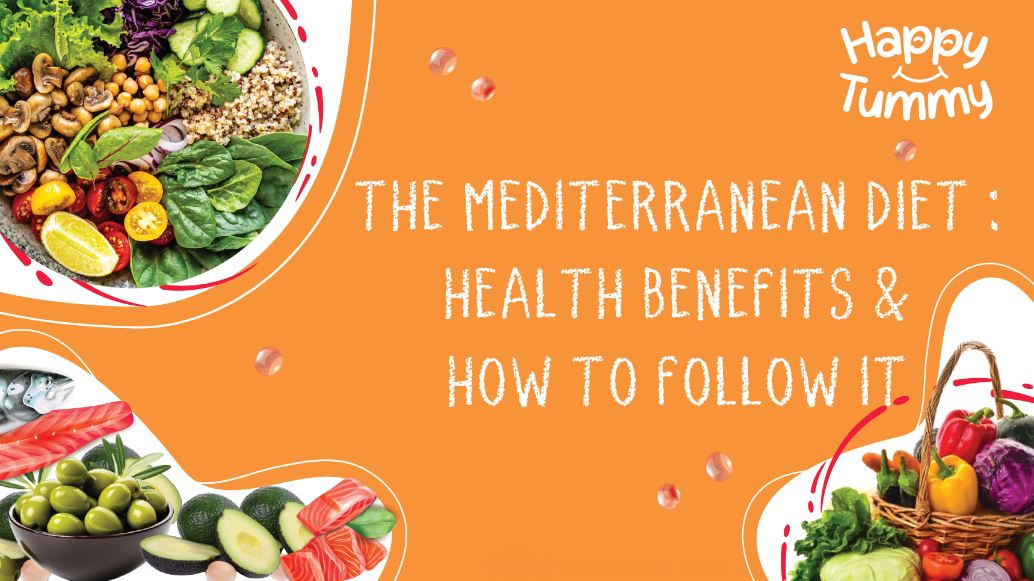Table of Contents
Imagine this: What would you do if your plate were a canvas you could fill and paint with anything? You will add colours and more colours. Right? How would you feel if you could have a delicious, colourful, and flavorful meal?
Welcome to the world of colourful and flavourful Mediterranean diet, which is more than just a diet. It is a culinary symphony of olives and other beautiful ingredients.
It ultimately celebrates fresh ingredients, heart-friendly oils, and numerous health advantages.
You can follow many different diets, but this one is nutritious and well-balanced. All ages, including your parents and children, will adore it.
So, why wait? Let’s read this post to find out more about the benefits of this colourful Mediterranean diet and how to implement it.
How Do You Adhere to a Mediterranean Diet and What Is It?
This diet focuses primarily on plant-based foods and healthy fats. Eating fruits, vegetables, and grains is all part of it.
Furthermore, the key ingredient in this wholesome and nourishing diet is olive oil.
How do you keep to this diet? When you choose to follow this diet, keep in mind the following information:
- Include lots of fruits, vegetables, lentils, beans, and nuts.
- Add more whole grains, such as brown rice and whole wheat bread.
- For oils, this diet only requires you to use extra virgin olive oil, which contains healthy fats.
- If you want to eat fish, it should be eaten in moderation and be rich in omega-3 fatty acids.
- A small amount of yoghurt and cheese.
- This diet has little to no meat as a part of it. Instead, you can go for poultry options.
- You should also avoid sugary drinks, sweets, and butter.
- You should also limit your alcohol consumption if you drink. With meals, a limited amount of alcohol is permitted.
The greatest thing about a Mediterranean diet is that it can be modified to fit the needs and medical conditions of an individual.
You can always contact a nutritionist and prepare an engaging eating plan.
Health Benefits of the Mediterranean Diet

Do you know the Mediterranean diet has been ranked the best for the seventh consecutive year by the U.S. News and World Report?
Want to know why? Let’s find out its fantastic health benefits:
#1 Mediterranean Diet for Diabetes
It has been established that this diet is a healthy and diabetes-friendly eating plan [1]. Whole, minimally processed foods such as fruits, vegetables, whole grains, legumes, nuts, and seeds are the mainstays of the diet.
These foods are high in nutrients and offer vital vitamins, minerals, and fibre without quickly raising blood sugar levels.
Healthy fats abound in this diet, especially the monounsaturated fats in avocados and olive oil. These fats can help control blood sugar levels and enhance insulin sensitivity.
An essential part of the diet, whole grains supply complex carbs that break down more gradually and deliver glucose into the bloodstream slowly.
This lessens the chance of sudden increases in blood sugar.
P.S. If you wish to know the fibre content in this diet’s ingredients, check it out on Aashirvaad’s My Meal Plan. By simply entering the ingredient name and quantity, you can figure out its fibre content.
#2 Mediterranean Diet for Heart Health
The heart health benefits of this diet are widely acknowledged [2].
Rich in omega-3 fatty acids from fatty fish, heart-healthy monounsaturated fats from olive oil, and antioxidants from fruits and vegetables, this diet actively encourages decreased inflammation, lowered cholesterol, and enhanced cardiovascular health.
Lean proteins and a diet low in red meat promote heart health, while whole grains and fibre help to reduce LDL cholesterol.
#3 Mediterranean Diets for Bone and Joint Health
This diet is good for maintaining bone and joint health because it strongly emphasizes nutrient-rich foods [3].
Nuts, leafy greens, and dairy products are rich sources of calcium, which helps maintain ideal bone density.
Nuts, olive oil, and fatty fish all supply important omega-3 fatty acids, which have anti-inflammatory qualities and may be able to relieve joint discomfort.
Furthermore, the availability of vitamin C and K-rich fruits and vegetables promotes collagen synthesis and bone mineralization.
#4 Mediterranean Diets for Chronic Diseases
This diet’s comprehensive and nutrient-dense approach to nutrition makes it an effective ally in the fight against chronic diseases [4].
Antioxidants, omega-3 fatty acids, and healthy monounsaturated fats are abundant in them, and they lower the risk of inflammation.
The anti-inflammatory characteristics of the diet, when combined with a wide variety of foods high in nutrients, promote general health and may reduce the incidence of several malignancies.
#5 Mediterranean Diet for Weight Loss
This diet encourages a sustainable and well-balanced eating style, making it a tasty and successful weight-loss strategy [5].
It promotes portion management and restricts consuming processed and refined foods by emphasizing complete, nutrient-dense foods, including fruits, vegetables, whole grains, and lean proteins.
Adding healthy fats like olive oil and nuts can increase satiety and decrease the chance of overindulging.
The diet’s focus on a range of vibrant, satisfying meals not only pleases the palette but also encourages sustained commitment to a balanced diet.
This diet plan is a tasty and effective method for reaching and keeping a healthy weight since it helps with weight management.
Regular physical activity and mindful mealtime practices are other important aspects of the Mediterranean lifestyle.
#6 Mediterranean Diet for Depression
This diet’s Potential advantages include reducing depressive symptoms [6].
This diet is linked to a lower incidence of depressive disorders because it is high in monounsaturated fats from olive oil, antioxidants from fruits and vegetables, and omega-3 fatty acids from fish.
These nutrients enhance the generation of neurotransmitters involved in mood control.
Whole grains, legumes, and nuts are also included because they offer vital elements that support general health.
With its focus on social interactions and communal meals, the Mediterranean lifestyle may also help foster a healthy attitude.
A holistic approach to mental well-being may benefit from incorporating a Mediterranean-style eating pattern.
Foods to Include in Mediterranean Diet
This diet focuses on eating healthy plant foods. You can also use a mix of fresh, dried, frozen, or canned vegetables and fruits.
However, it is essential to check its salt and sugar content.
Below are the different food items that you can include in your diet plan:
- Vegetables – Broccoli, tomato, kale, onions, spinach, carrots, cauliflower, cucumbers, Brussels sprouts, potato, turnips, and sweet potato
- Fruits – Bananas, apples, pears, oranges, strawberries, dates, grapes, melons, figs, and peaches
- Nuts, Nut Butter, and Seeds – Walnuts, almonds, hazelnuts, macadamia nuts, cashews, sunflower seeds, almond butter, pumpkin, and peanut butter
- Legumes – Peas, beans, pulses, lentils, chickpeas, and peanuts
- Whole Grains – Brown rice, oats, rye, corn, barley, whole wheat bread, buckwheat, and pasta.
- Seafood and Fish – Sardines, salmon, tuna, trout, shrimp, mackerel, oysters, clams, mussels, and crabs
- Poultry – Duck, chicken, and turkey
- Eggs – Quail, chicken, and duck
- Dairy – Yogurt, cheese, and milk
- Spices and Herbs – Basil, garlic, rosemary, mint, nutmeg, sage, pepper, and cinnamon
- Healthy Fats – Olives, extra virgin olive oil, avocado oil, and avocado
Foods to Avoid in Mediterranean Diet
Here are a few things that you must avoid when following this diet:
- Process Red Meat – Hot dogs, bacon, lunch meats, and sausages
- Heavily Process Food – Frozen meals with high amounts of sodium, sodas, sugary beverages, sugary desserts, candy, and processed cheese
- Refined Grains – White bread, white pasta, and products with white flour
- Alcohol (only exception red wine)
- Butter
- Refined, Processed, or Hydrogenated Oils – Soybean, sunflower, corn, vegetable, canola, and Hydrogenated and partially-hydrogenated
How to Include Different Foods in the Mediterranean Diet?
How to follow this fantastic diet is often a question people ask. It is not only about knowing the different things you can eat but also about understanding how to eat them and at what frequency. Let’s find that out below:
- Food you can eat daily – Whole grains, legumes, fruits, vegetables, healthy fats, herbs and spices
- Food to eat 2-3 times a week – Fish, seafood, and omega-3-rich food
- Food to be consumed 1 or 2 times a week – Poultry, milk and eggs
- Food to eat rarely – Sweets and red meat
- Things to do daily – Physical activity, family and mealtime
Myths and Facts Associated with Mediterranean Diet
The numerous advantages of joining hands with the Mediterranean lifestyle, especially diet. However, there are always things that people have questions about.
Let’s debug some myths and facts associated with this beautiful diet.
| Myth | Fact |
| This diet will be costly to follow. | If you include lentils or beans as the protein source and use more plant-based products, it will be more reasonable than regular food planning. |
| If one glass of wine is good, three glasses will be three times great for the heart. | Everything in excess is wrong for health, and it is the same for wine. One glass for women and two for men are considered healthy in a day. More than this can be bad for heart health. |
| This diet involves eating a lot of bread and pasta. | Pasta is a side serving in this diet with only ½ cup – 1 cup per serving. The bread is also whole wheat bread but in limited quantities. |
| This diet is only about food. | This diet is not just about food, but also about its unique lifestyle. They don’t eat in front of the TV or in a hurry. They enjoy the meal by sitting with their loved ones and being relaxed. It also involves a lot of physical activity. |
How to Begin a Mediterranean Diet?
Starting any new diet can be tricky and challenging as it involves restricting yourself to certain things and changing your eating habits.
However, with this diet, you must not stop eating your favourites; you must eat them in moderation.
Follow these simple tips to get started with a healthy and colourful diet plan:
- Always consider whole grains and vegetables as your main dish and meat as your side dish.
- Keep fruits to finish your meal on a sweeter note, just like desserts work. You can grill, boil, or bake the fruits and squeeze lemon juice for extra flavour. Add a scoop of vanilla yoghurt and sprinkle some cinnamon to make it a wholesome dessert.
- Search different recipes online and try to include new dishes to avoid getting bored of eating the same food.
- Always keep some healthy snacks in the store to munch when hungry, or you can eat non-healthy products.
Final Thoughts
The Mediterranean diet celebrates good health, long life, and the delight of appreciating the small things in life.
Every component, from the colourful mix of fruits and vegetables to the heart-healthy hug of olive oil, adds to a harmonious whole.
This diet is an invitation to a way of life that satisfies the palate, nourishes the body, and promotes a feeling of vitality. It’s more than just a commitment to healthy eating.
FAQs
Give priority to foods like fruits, vegetables, whole grains, and lean proteins if you follow this diet. Consume fish and heart-healthy fats; avoid red meat; and adopt a pleasant meal and exercise-focused lifestyle.
The focus on delicious, whole foods—fruits, vegetables, grains, and lean proteins—makes this diet simple. It becomes a fun, sustainable lifestyle option with tasty selections, diversity, and flexibility.
It is feasible to adopt this diet while living in India. Accept regional differences by adjusting the diet to suit local preferences by including fruits, vegetables, whole grains, and healthy fats like olive oil.















